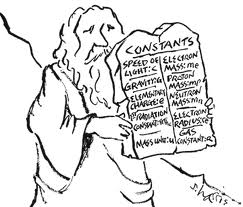When I was in grade school and high school, I loved my science classes. I loved the chemistry lab and the biology classes (not just the applied biology classes that met under the bleachers after school) and the ways in which they explained the wonderful world around me. Unfortunately, though, there were two aspects of science with which I never was able to come to terms: higher mathematics and physics.
For me, higher mathematics begins just after addition, subtraction, multiplication, and division. Algebra was passable, trigonometry and geometry (plane and solid) were okay, but calculus and beyond ... fuhgeddaboudit. As long as my checkbook balances to within a few dollars of where I think it should be, I have enough math for personal use. For more complex mathematical concepts I have Agnes, who understands figures in a way I never could and never will (and her own figure is pretty impressive, I can tell you).
But physics ... physics is just way out beyond the intellectual orbit of Pluto. It's full of derivatives and integrals and constants Greek letters and other weird stuff. Valuable, I suppose. Comprehensible, no way.
Which is why I like to have my physics reduced to a level at which I can comprehend the concepts. Thanks to Miss Cellania, who the other day published this handy guide to the Laws of Household Physics (with a few additions of my own, of course) ...
1. A child's eagerness to assist in any project varies in inverse proportion to the ability to actually do the work involved.
2. Leftovers always expand to fill all available containers plus one.
3. A newly washed window gathers dirt at double the speed of an unwashed window.
4. The availability of a ballpoint pen is inversely proportional to how badly it is needed.
5. The same clutter that will fill a one-car garage will fill a two-car garage.
6. Three children plus two cookies equals a fight.
7. The potential for disaster is in direct proportion to the number of TV remote controls divided by the number of viewers.
8. The number of doors left open varies inversely with the outdoor temperature.
9. The capacity of any hot water heater is equal to one and one-half sibling showers.
10. What goes up must come down, except for bubble gum, kites and slightly used Rice Krispies.
11. Place two children in a room full of toys and they will both want to play with the same toy.
12. The willingness of children to eat the meal you have prepared varies inversely with the cost of the ingredients and the time required for preparation.
13. A freshly-mopped and scrubbed floor attracts spills like a lodestone draws iron filings.
14. The probability of a noisy squabble between two children increases with the importance of the telephone conversation you are trying to conduct.
If you are a parent or grandparent, you already understand the essential truth of these laws. If you are not yet a parent ... you will. Good luck!
Have a good day. More thoughts tomorrow.
Bilbo

Those are remarkable -- like the toastwill always fall butter-side down!
ReplyDeleteBlame Newton and Leibniz for the calculus. And René Decartes for analytic geometry. He put de cart before the horse with that!
Hey this needs to go into the parenting manual that doesn't exist yet.
ReplyDeleteCalculus is really a conspiracy/myth developed to ingflate the salaries of engineers.
ReplyDelete'2. Leftovers always expand...'
ReplyDeleteWhat are these 'leftover' things you talk of?
If you live in an apartment, you might get one tub bath or one and a half showers with hot water.
ReplyDelete